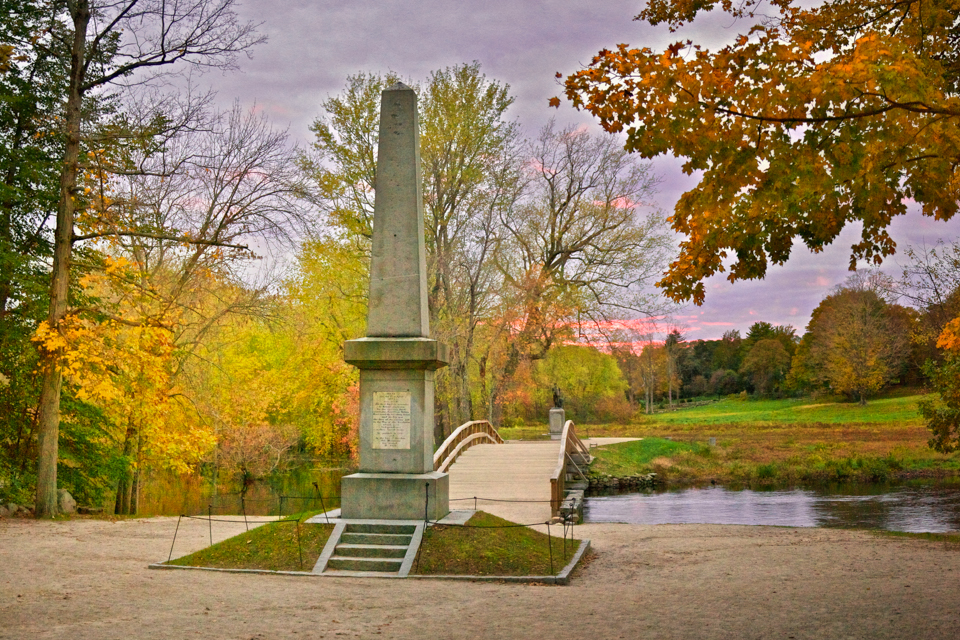Boston Herald | Op-Ed| April 18, 2011

Old North Bridge over the Concord River at Sunset, Minute Man National Park, Concord, Middlesex County, Massachusetts
By the rude bridge that arched the flood,
Their flag to April’s breeze unfurled,
Here once the embattled farmers stood
And fired the shot heard round the world.
— Ralph Waldo Emerson
Today, Massachusetts celebrates Patriots’ Day. In towns across the commonwealth, crowds will gather for parades of marching bands, scout troops and public officials. In Lexington and Concord, Redcoats and Minutemen will reenact the events of April 19, 1775, and that legendary march to the North Bridge.
The festivities would make Paul Revere proud. But Revere would roll over in his grave if he knew that “the shot heard round the world” and the battle that put Concord on the map receive minimal attention in Concord’s elementary schools.
Remarkably, many “enlightened” Massachusetts towns have for years flagrantly ignored the Massachusetts History and Social Science Curriculum Frameworks.
Adopted in 2003, the frameworks detail not only the skills that students need to master but the content they should study.
The third grade learning standards, foir example, state that students should be able to “explain the political, economic, and military developments leading to and during the American Revolution,” including the Boston Tea Party, the battles of Lexington and Concord and the Battle of Bunker Hill. They also call for third-graders to study the lives of Massachusetts patriots. Yet, it is a safe bet that more Massachusetts children have read biographies of sports legends Ted Williams or Tom Brady than of founding fathers John Adams or John Hancock.
Many schools — if they teach history at all — ignore the framework’s emphasis on Massachusetts founders and the political relevance of events and focus instead on social history, such as colonial cooking and Native American crafts.
Why? Because many educators today regard the study of our revolutionary past as politically incorrect (too many “dead white males” and too much emphasis on war).
They reject the notion that public schools should teach kids to think of themselves as Americans united by a common past and a common purpose. Instead, they teach kids to think of themselves as members of distinct racial and ethnic groups and as global citizens without any national identity at all.
But the failure to teach American political history has practical, as well as ideological, roots.
With limited hours in the day, teachers inevitably prioritize those subjects for which they will be held accountable (mostly math and English Language Arts). When it comes to history, the state frameworks simply have no enforcement mechanism.
Although the state began to pilot tests for history, the Board of Elementary and Secondary Education in 2009 voted to postpone implementation of a 10th grade history MCAS graduation requirement, citing budgetary constraints.
Unfortunately, for those who care about history education, matters are only going to get worse.
Last summer, Gov. Deval Patrick agreed to scrap our best-in-the-nation curriculum frameworks in favor of the academically weaker national “Common Core” standards. Shockingly, the watered down national standards focus only on skills and do not require schools to teach any particular body of knowledge. Without state pressure to teach American revolutionary or political history, public schools in liberal communities like Concord will likely now abandon any pretense of doing so.
The failure to teach our children the story of America is, of course, more than a local problem. It is a national embarrassment. But it is particularly ironic that here, in the birthplace both of American public education and of American liberty, many schools never teach students why a rag tag group of farmers were willing to risk their lives for freedom from political tyranny.
###
